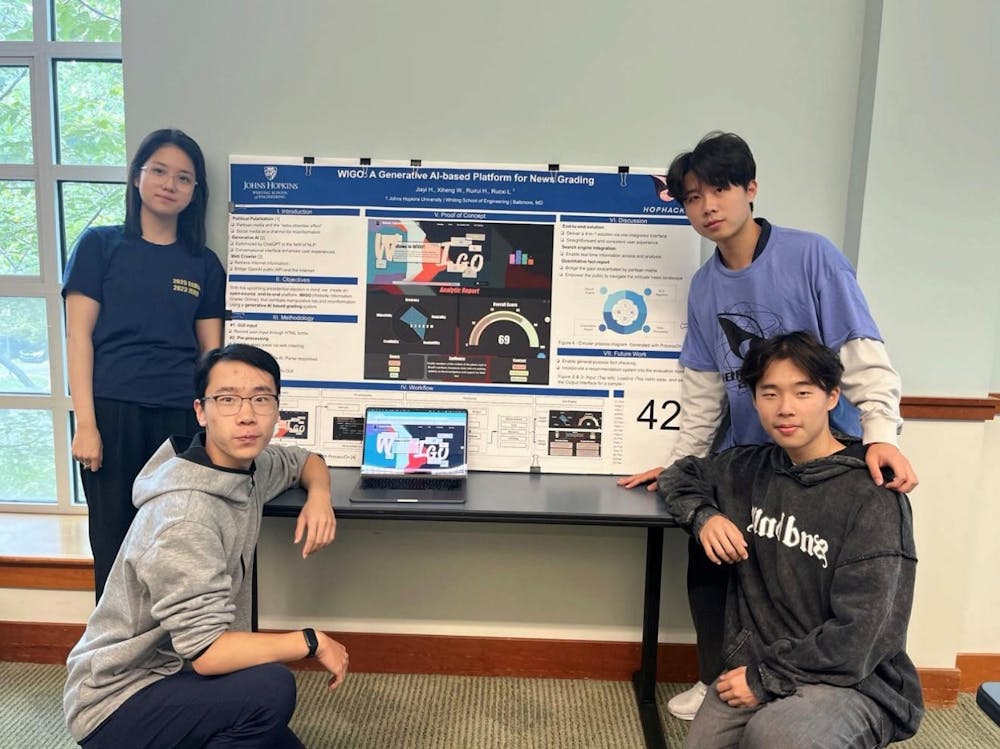HopHacks is the big name that brings passionate engineering students from across Maryland together with the common fantasy of transforming innovative ideas into working prototypes within a mere 36 hours.
Designed to have something for everyone, HopHacks presents several tracks from which the participants can choose, from the general track that allows for open-ended innovation to more niche themes like the Patient Safety Technology Challenge. According to the 2023 Director of HopHacks Akhil Deo, the weekend aims to encourage growth and experimentation.
“We envision that HopHacks will benefit students from all backgrounds by fostering hands-on learning in computer science, encouraging innovation and entrepreneurship through the creation of proof of concepts and prototypes, providing networking opportunities with our corporate sponsors and facilitating connections with like-minded peers, cultivating lifelong friendships,” Deo said in an email to The News-Letter.
Excited and adventurous, four freshmen — Tom Wang, Kevin Liu, Jonathan He and I — decided to embark on this adventure. Looking through the website before the game day, we decided to shoot for the Institute for Assured Autonomy (IAA) track, knowing that the prompt would be revealed at the start of the game.
Sept. 15, 9 p.m.
As all the participants gathered in the auditorium downstairs of Hodson Hall, the moment we had been eagerly awaiting finally came — the release of the theme!
To our surprise, the IAA track was not about autonomous vehicles or life-critical systems, which are the two big areas of usage of assured autonomy in academia. Rather, the challenge set before us was elusive and intriguing: “Create a generative AI-based grading system for detecting lies and mis/disinformation.”
Quickly jotting down the prompt, we hurried upstairs to find a “hack room” and set up our workstations. Hodson 311 became our battlefield for the weekend.
Blanking, we decided that the first and most crucial task was to decipher the prompt and to understand what those big words meant.
Our discussion started with "Generative AI.” Though a full-scale generative AI trained with unsupervised learning techniques would certainly be impressive, it required extensive data and computing powers and would certainly be impossible to implement within 36 hours.
Alternatives? We quickly thought about ChatGPT — not asking ChatGPT to give us the solution but to leverage the language model itself. By leveraging OpenAI's public application programming interface (API), a powerful and mature generative AI model in the field of natural language processing (NLP), the problem of the dataset can be quickly solved.
With a clear direction, we soon started brainstorming user cases. We quickly thought of the news industry, namely the partisan media, the upcoming presidential elections and the growing polarization that divides constituents.
“How cool would it be if we could create a news analysis tool capable of identifying biases while providing supporting evidence to the constituents,” one of my teammates said.
Working against the clock, we quickly mapped out the architecture as well as the technical components of the system.
We had four key components: a user-friendly user interface (UI), a backend preprocessing unit to parse data for OpenAI, a backend computing unit to integrate the AI model and grading system and a UI output for presenting the full evaluation report to users.
Proud of the idea, we were unsure if we could bring it to life. Having no prior experience in NLP, we decided to learn the basics of web development and API integration from scratch.
With such a grand vision, we decided to divide and conquer. At the time we started delving into learning the developmental process, it was already 11:32 p.m. We decided to sacrifice the first night's sleep to get some learning done.
Sept. 16, 5 a.m.
Exhaustion crept in as our work began to take shape. We tested our web crawling API to ensure it was functioning smoothly, and we successfully integrated our search engine with OpenAI through private API tokens. At the same time, the combination of JavaScript, CSS and HTML was promising for the front end.
We decided to take a few hours of much-needed rest. Stepping out of the hack room, the campus was chill and quiet.
Sept. 16, 10 a.m.
Reconvening, we were ready to start integrating our work. With two of us working to stabilize the backend, the other two started preparing for the showcase that would happen in less than 24 hours. Though it was our first time working together, we were able to collaborate and make sure all the work was done.
With different aspects of our project taking shape, we started fine-tuning every detail and taking shifts to get some sleep. When the poster for the presentation was printed at 5 a.m., we finally got to rest knowing that we were ready for the show.
Sept. 18, 9:15 a.m. — SHOW TIME!
We gathered once more, with demos and scripts well practiced. In a science-fair fashion, we set up our posters at our station and waited for the judges.
The judging session turned out to be nerve-wracking and immensely rewarding at the same time. As we anxiously anticipated all the questions the judges might ask, we were surprised to see how positive and encouraging all the feedback was. We were excited by how the judges delved into the intricacies of our implementation, providing professional feedback on how to enhance the robustness and objectivity of our grading system.
But even without all this, we had already won our battle and felt proud of what we had achieved. We did it! We had transformed a fantasy into an actual project, from knowing nothing about the project to being able to eloquently explain the project to the software professionals.
We left HopHacks with a sense of achievement, excitement for future endeavors and more confidence in ourselves that we can do anything if we can dream big and work hard.
Until next time, HopHacks!





